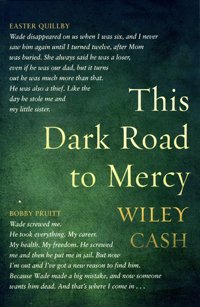After a stunning critical reception for A Land More Kind Than Home last year, North Carolina author Wiley Cash faces the sternest challenge – the second novel. And he delivers…
Bobby Pruitt has scores to settle. He once had high hopes of a professional baseball career, but now works the door at a third rate nightspot. When his boss, a small time crook, is fretting over the loss of a stash of stolen money, Pruitt senses that he can both recover the money and get revenge on old enemy.
Easter Quillby and her younger sister Ruby are, effectively, orphans. Their father left home long ago, and Easter sat by the bed while her mother went into a drug-induced coma, and died. Now, they are wards of the state living in an institution. When their absent father, Wade Chesterfield, turns up in the middle of the night with a beat-up truck, a bag full of $100 bills and a crazy plan, Ruby is determined to go with him. Easter is dubious, if not downright hostile to the idea, but feels she has to go along if only to protect her younger sister.
Brady Weller is an ex-cop – jailed and fired for his part in a tragic accident. This ended his marriage, and he has a cordial but increasingly distant relationship with his teenage daughter. Now, he works for his brother-in-law’s home security firm, but is also a guardian ad litem – a trusted adult sanctioned to work with vulnerable children. When the Quillby girls disappear, he calls in a few favours from a former police colleague, and tries to track them down.
Baseball is central to the story. Its iconic status in American society is stamped through the book as indelibly as Welcome to Blackpool is in a stick of seaside rock. Chesterfield links to Pruitt through baseball, as the race for the season’s most home runs is played out on screens in every bar in the story, and the book’s climactic sequence plays out in Busch Stadium, St Louis. Even if you don’t like sports, this is no drawback at all – it’s vital to the characters and the storyline.
The paths of the main characters inexorably converge, and there is a wonderful triangular shape to the plot as everything narrows down and focuses on the climax. As Wade ducks and dives through the Southern landscape with his bemused daughters in tow, the embittered Pruitt blunders after them, usually several gas stations behind. On the trail of all of them is Weller – damaged and resentful, but with a huge sense of purpose.
One of Cash’s talents is his use of a child as narrator for parts of the story. He did it with great panache in A Land More Kind Than Home, and here he shows that was no fluke. Easter Quillby is a girl on the verge of womanhood. What she’s seen has tarnished the lens of childhood, but when she tells us about Ruby, about Wade and about her late mother, her voice is simple, honest but perceptive.
Cash set the bar high with his debut novel. There was genuine darkness and tragedy in A Land More Kind Than Home. Here, the great evil of religious bigotry is replaced by plain old criminal greed. In that sense, This Dark Road to Mercy is more of a crime novel, but the warmth and almost painful perception of the writing remains constant. The plotting is effortless and assured, not a word is wasted, and I am convinced that this will be one of the great novels of 2014.
This Dark Road to Mercy is released on 28 January. Read our interview with the author here.
Doubleday
Print
£10.99
CFL Rating: 5 Stars
